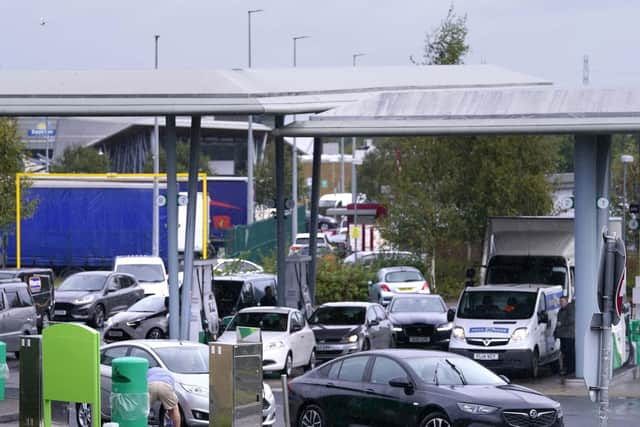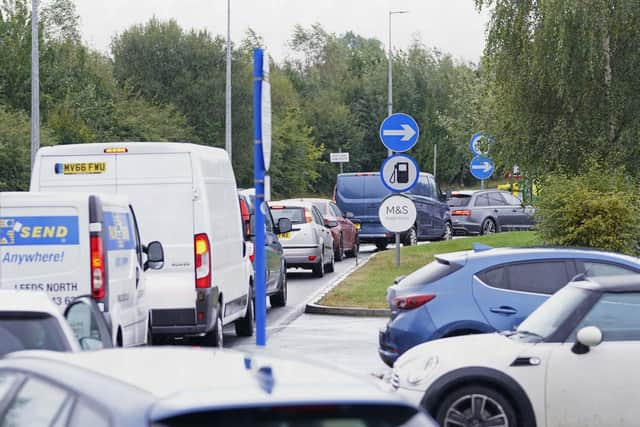Leeds MP Rachel Reeves blames Government immigration policies for petrol crisis
and live on Freeview channel 276
It comes after fears of disruption to the fuel supply sparked panic buying across the country, leading to long queues at pumps.
Shadow chancellor Rachel Reeves, MP for Leeds West, spoke to ITV's Good Morning Britain on Monday, September 27.
Advertisement
Hide AdAdvertisement
Hide AdMs Reeves: “Since last year I have been meeting and talking with the Road Haulage Association and hauliers about some of the problems coming down the line.


“The Government ignored those problems, which is why we are now facing the situation where people go to the supermarkets and see shortages of goods on the shelves, and why they are queuing up at petrol stations and not being able to fill up their tank.
“That is not acceptable, this is an out-of-touch and complacent government.”
She added: “Most people couldn’t care less whether the HGV is being driven by a British worker or a foreign worker.
Advertisement
Hide AdAdvertisement
Hide Ad“What they want to know is when they get to the petrol station, they are able to fill up their car; when they are trying to get presents for their kids at Christmas they are going to be delivered; and when they are trying to order food it is available in our supermarkets and on online deliveries.


“At the moment, because of this Government’s out-of-touch, complacent and negligent nature, those things are not guaranteed.”
The panic buying spree was sparked last week after concerns from BP were leaked that the shortage of lorry drivers could impact upon its ability to keep up with fuel deliveries.
The surge in demand led the PRA to warn that as many as two thirds of its membership of nearly 5,500 independent outlets were out of fuel on Sunday, with the rest of them “partly dry and running out soon”.
Advertisement
Hide AdAdvertisement
Hide AdA statement by Shell, ExxonMobile and other industry bodies again insisted there was no “national shortage of fuel” and that the pressures on supply were the result of “temporary spikes in customer demand”.
Environment Secretary George Eustice has called on motorists to stop “panic-buying” petrol and return to their normal pattern of purchasing.
Mr Eustice said there was not a shortage of fuel and blamed motorists for filling up when they did not need to for some petrol stations running dry.
“The most important thing is that people buy petrol as they normally would. There isn’t a shortage. There have been some shortages of HGV drivers getting petrol to forecourts but actually that is quite limited,” he said in a pooled clip for broadcasters.
Advertisement
Hide AdAdvertisement
Hide Ad“The cause of these current problems is that panic-buying episode and the most important thing is for people to start buying petrol as they normally would.
“There does come a point – as we saw during a previous episode of panic-buying during the pandemic on food – where things settle down and people get used to it, and return to life as normal again.
“The sooner people do that the better. The only reason we don’t have petrol on the forecourts is that people are buying petrol they don’t need.”
Emergency measures were triggered on Sunday evening, with Business Secretary Kwasi Kwarteng choosing to suspend competition laws for the fuel industry to allow suppliers to target filling stations running low.
Advertisement
Hide AdAdvertisement
Hide AdThe move came after Mr Johnson said the Government was creating 5,000 three-month visas for foreign lorry drivers in an attempt to ease the pressure on hauliers which has been blamed over the problems.
Multiple reports have suggested that Boris Johnson will mull whether to follow that by taking the drastic step of sending in the Army to drive oil tankers as “frenzied buying” added to fuel supply issues caused by a lack of HGV drivers.
Transport Secretary Grant Shapps has refused to rule out requesting military assistance after queues for the pumps continued across the country on the weekend.
The Petrol Retailers Association (PRA) chairman Brian Madderson confirmed some training had been taking place “in the background” for military personnel.
But he warned it was not an “absolute panacea” and that there was no “single lever” the Government and the industry could pull to resolve the crisis.